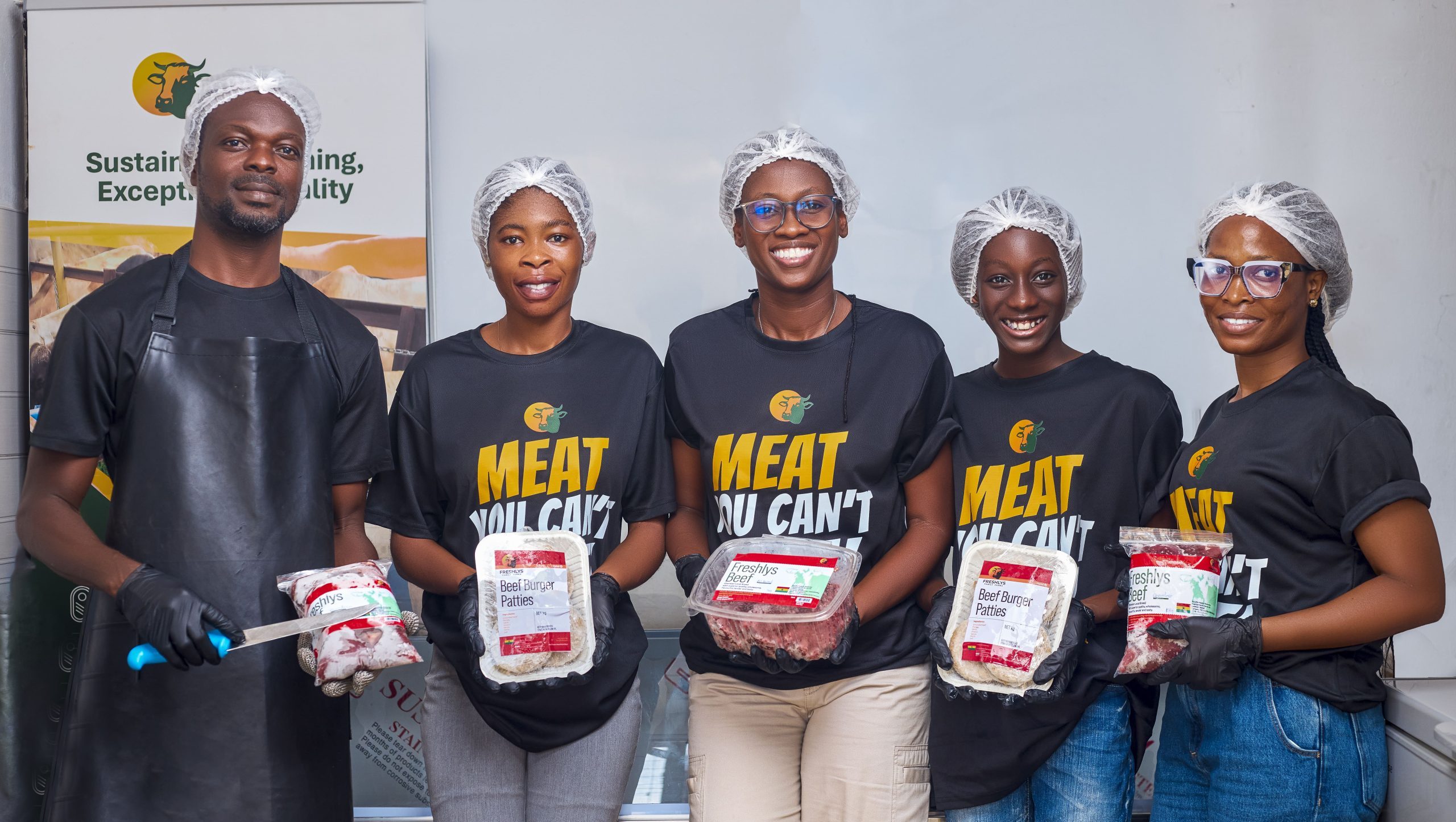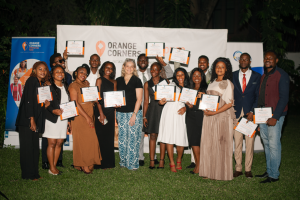Esther Ofori Boadu is the co-founder and CEO of Freshlys Family Farms, a livestock business focused on improving meat quality in Ghana by specialising in producing and selling premium beef, chicken, goat and lamb sourced from trusted local farmers. Esther identified a gap in Ghana’s livestock sector, where traditional farming methods often lead to lower-quality meat. Through innovative, intensive farming practices and with support from Orange Corners Ghana and the Orange Corners Innovation Fund (OCIF), she has expanded her operations and built a strong local network. Committed to sustainability and empowering other farmers, this pioneering female entrepreneur is making significant strides in a male-dominated industry.
Hi Esther! Could you introduce yourself and your business, Freshlys Family Farms?
I’m Esther Ofori Boadu, co-founder and CEO of Freshlys Family Farms. My journey into farming began with vegetables and poultry, but my passion truly ignited when I noticed a significant gap in Ghana’s livestock sector. After unsatisfactory experiences buying meat, I delved into Ghana’s local meat production and quickly realised there was a huge opportunity to introduce better quality meat. This led me to establish Freshlys Family Farms, a livestock farm that specialises in sourcing high-quality beef, chicken, goat and lamb from trusted local farmers in order to sell high-quality meat in Ghana. Our company was officially registered in 2020, but the livestock segment is a bit newer – just three years old.
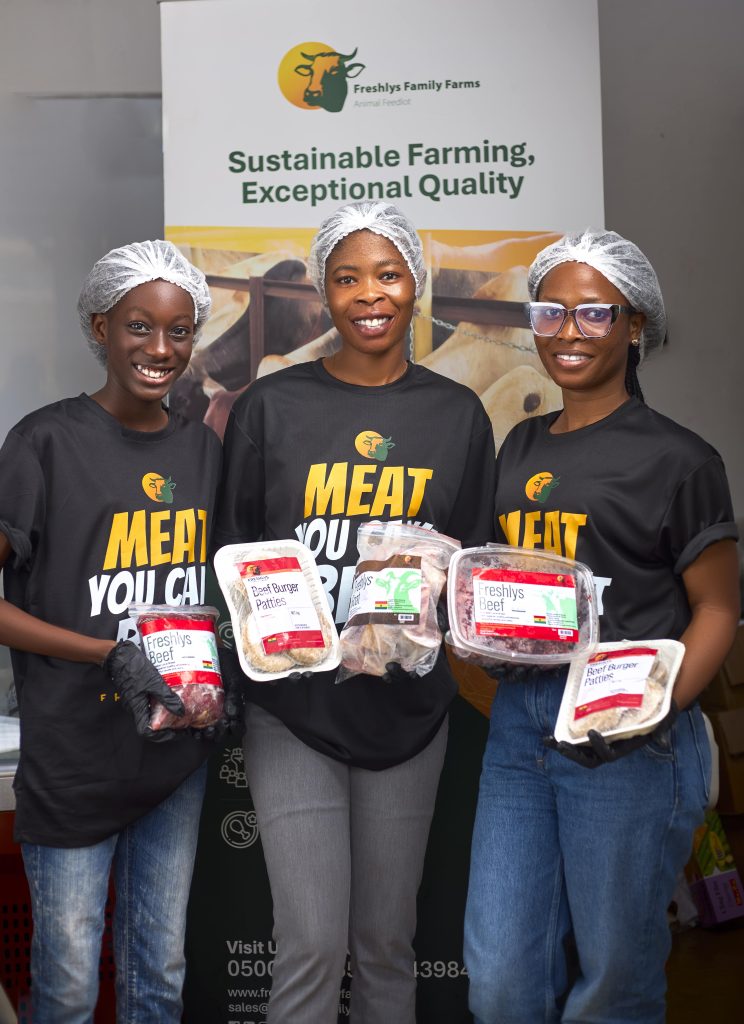
Venturing into livestock farming, the core problem I aim to solve is the lack of intensive farming practices in Ghana. Most farmers here treat animals as a means for storing capital. As such, the animals simply graze without an intentional focus on being raised and fed for optimal meat quality. This results in beef that many described as “chewy and hard”. As such, most hotels and restaurants import prime cuts. A significant portion of cattle in Ghana actually comes from neighbouring countries like Burkina Faso, Togo or Nigeria, highlighting the lack of properly set up livestock farms locally. Recognising this, I saw a clear opportunity to establish an intensive livestock farm where we’re intentional about growing the right feed for the animals, giving them what they need to be able to give us back what we need.
In 2023, I won OCIF. It arrived at the perfect time. I primarily used the funds to acquire essential machines and equipment, which enabled me to establish my own butchery and processing capabilities in Haatso. This move significantly increased my sales, by 125%. Furthermore, OCIF provided valuable hands-on training that helped me formalise my business, ensuring all my documentation, registration and compliance were in order. Now, I’m proud to lead a growing team of 15 staff members. Beyond my internal team, I also collaborate with about 80-100 smallholder farmers, purchasing animals and resources from them to support the local economy.
We’re intentional about giving our animals what they need to be able to give us back what we need
As a farmer, you’re committed to sustainability. Could you tell us more about how you’re fostering a circular economy?
At Freshlys Family Farms, fostering a circular economy is at the heart of my operations, driven by a strong commitment to regenerative practices and waste reduction. My goal is to transform what might be considered ‘waste’ into valuable resources, creating a truly sustainable system.
One of the most significant ways I achieve this is by integrating waste streams from other agricultural businesses into my livestock feed. This inter-farm synergy is a cornerstone of my circular model. One example of such a waste stream is cassava peels. I actively purchase cassava peels from cassava farmers. These peels, which are often discarded after cassava processing, become a valuable, nutritious feed source for my animals. This not only reduces agricultural waste but also provides an affordable, local feed option. Similarly, when maize farmers face challenges such as insufficient rainfall, their maize crops may not reach full maturity. Instead of letting these underdeveloped crops go to waste, I acquire them to feed my animals. This turns a potential loss for maize farmers into a resource for my farm.
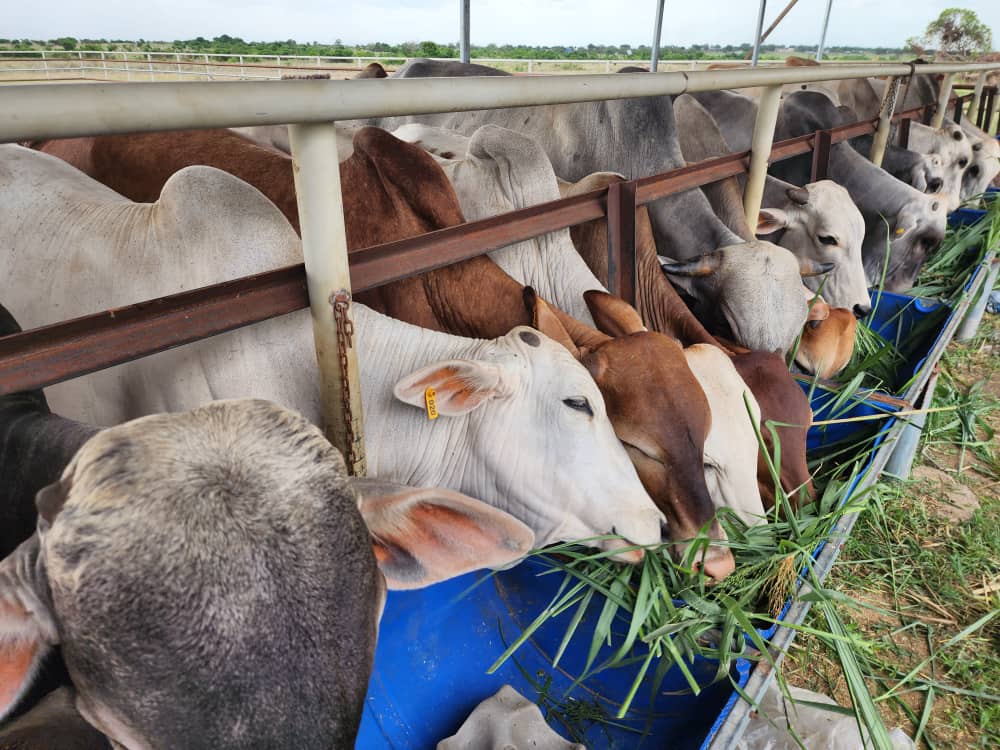
Beyond external collaborations, I also implement robust circular practices directly within my own livestock farm to maximise resource efficiency. For instance, the dung produced by my animals isn’t discarded; it’s a vital resource. We use this manure as a natural fertiliser for the feed we cultivate on the farm, such as alfalfa, Napiergrass and maize. This establishes a closed-loop system: we feed the animals, their waste enriches the soil, and that enriched soil then grows more feed for the animals. Any other organic waste generated on the farm is also carefully composted and applied back to the land. These practices are immensely beneficial for soil health, allowing us to avoid dependence on synthetic fertilisers. I’m very intentional about minimising the use of chemicals that can harm the beneficial microorganisms in the soil, allowing the soil to naturally replenish its nutrients and maintain its health.
Looking to the future, I have exciting plans to expand these circular initiatives even further. One future key project is to utilise the waste generated from meat processing, specifically bones, to produce bone broth and pet food. These are deliberate steps towards regenerative agriculture.
In addition to that, my intention is not just to set up my own farm, but also to train other local farmers on how to adopt intensive farming methods. We share our knowledge and grow feed like Napiergrass and maize for them. This helps them produce good quality meat for sale, addressing a critical need in the market and enhancing sustainable practices.
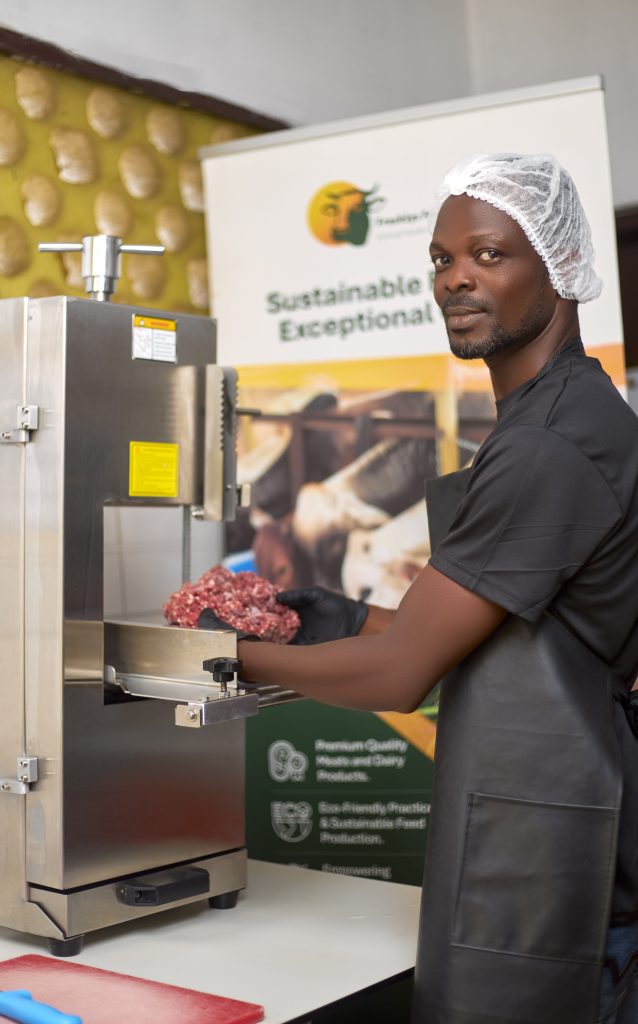
What’s it like being an female livestock farmer in Ghana?
Being a female founder in the livestock industry in Ghana presents a unique set of experiences. My field is overwhelmingly male-dominated; it’s rare to find other women involved in cattle farming. This comes with both significant challenges and surprising advantages.
One of the challenges I occasionally encounter involves navigating dynamics where some men may find it difficult to take direction from a woman, which can sometimes lead to resistance or tension. An example is access to land, which is a big deal in Ghana. When negotiating for land, particularly when dealing with chiefs, I’m often advised to go with a man or an older male who funds the transaction. Without a male escort, I can be tossed back and forth, with attempts to extort money simply because I’m a woman.
Access to finance is another significant hurdle. For some inexplicable reason, it often seems easier for men to secure funding compared to women. While there’s a growing focus on empowering women today, which is certainly helpful, it doesn’t entirely negate this persistent issue. That said, I’ve also experienced the other side of the spectrum. Many men in the industry have been incredibly supportive, respectful and even protective in a positive way.
Lastly, balancing family life with the demands of running a business is a complex act. There’s a common misconception among family members that because you own your business, you’ll have more free time. The reality, however, is quite the opposite. Especially in the early stages, an entrepreneur wears many hats (e.g. CEO, accountant, marketing manager) before having the capacity to hire staff for these roles. This means balancing family requirements with intense business management can be quite difficult.
Despite these difficulties, there are rewarding aspects. Being in a male-dominated area often garners a great deal of respect for me and for what I do. It feels good to be recognised for my efforts and contributions in a field where women are so scarce. The journey is demanding, but it’s also one of immense personal and professional growth.
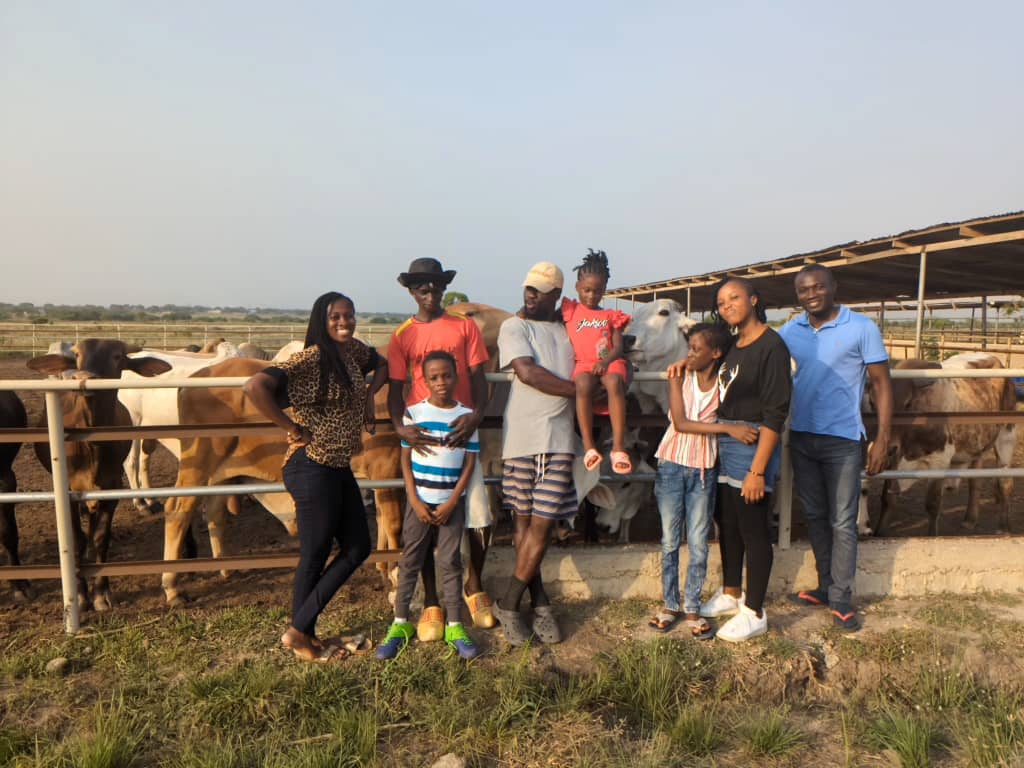
How do you envision the future for Freshlys Family Farms?
I envision a very dynamic and expansive future for Freshlys Family Farms, driven by scaling our operations and market reach. We have significant room to increase our capacity, and these strategic expansions are at the top of our list.
First, we plan to expand our butchery. Currently, we have a butchery situated in town called Haatso, where customers can reach us through social media and word-of-mouth recommendations, and from where we deliver directly to hotels and restaurants. The expansion will involve moving to a larger space and establishing another butchery in a different community where we’ve identified a strong market potential.
Second, we’re committed to diversifying our livestock by introducing cows and venturing into dairy production. Currently, our farm focuses solely on fattening bulls. However, there’s a substantial market for dairy products, as many of my existing meat customers have also expressed interest in dairy. We possess the capacity to integrate dairy farming, allowing us to merge our beef and dairy offerings, which will be a significant step in meeting broader customer demands. This move is planned to begin early next year.
Lastly, we aim to expand our market reach beyond Ghana, focusing on exportation of processed meats. We’ve already received interest from several African countries, including Tunisia, Togo and Tanzania. This international expansion will allow Freshlys Family Farms to tap into new markets and showcase the quality of Ghanaian livestock products on a broader scale.
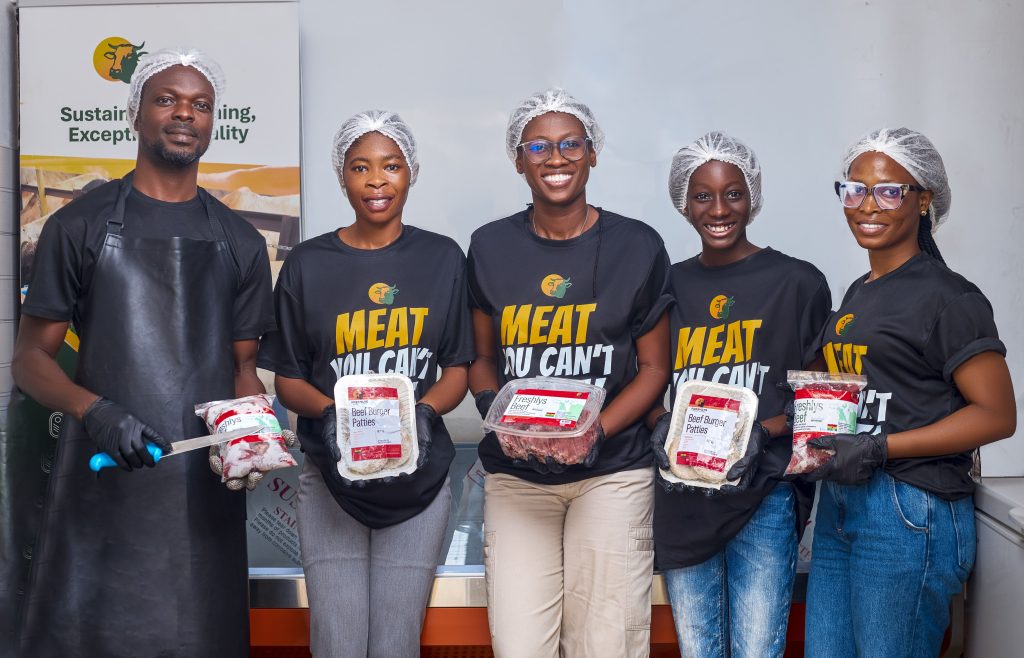
What do you need at this point to further scale your operations?
To truly achieve these ambitious plans for Freshlys Family Farms and realise our full potential, we primarily need two crucial resources: specialised expertise and funding. While we’ve secured an expert for the dairy aspect of our expansion, we’re still actively seeking expertise for the butchery component. This includes specific knowledge in meat butchery, food systems and storage, and meat processing into other products, such as pet food.
Beyond expertise, access to funding is important for implementing our expansion plans. We also welcome any form of support in business development. Having a strong network and learning from other entrepreneurs is incredibly valuable to us. We’re a significant investment opportunity and kindly welcome further support to push us forward and realise our vision of a healthier, more sustainable food system in Ghana and beyond.
My key advice is not to continue doing business on a small scale.. formalise your businesses and expand beyond a small scale!
Lastly, what advice would you give to young entrepreneurs that are just starting out?
In Ghana, there are many opportunities in the agriculture sector, as we haven’t tapped much into it yet, and the demand for food keeps growing. My key advice is not to continue doing business on a small scale; instead, we need to formalise our businesses and expand beyond a small scale. To achieve this, I strongly recommend to seek out and leverage on acceleration programmes like Orange Corners, as they offer funding, resources and a supportive network that can help to grow your confidence. Furthermore, formalising your business by registering and complying with regulation is crucial. And lastly: think big as much as possible!

